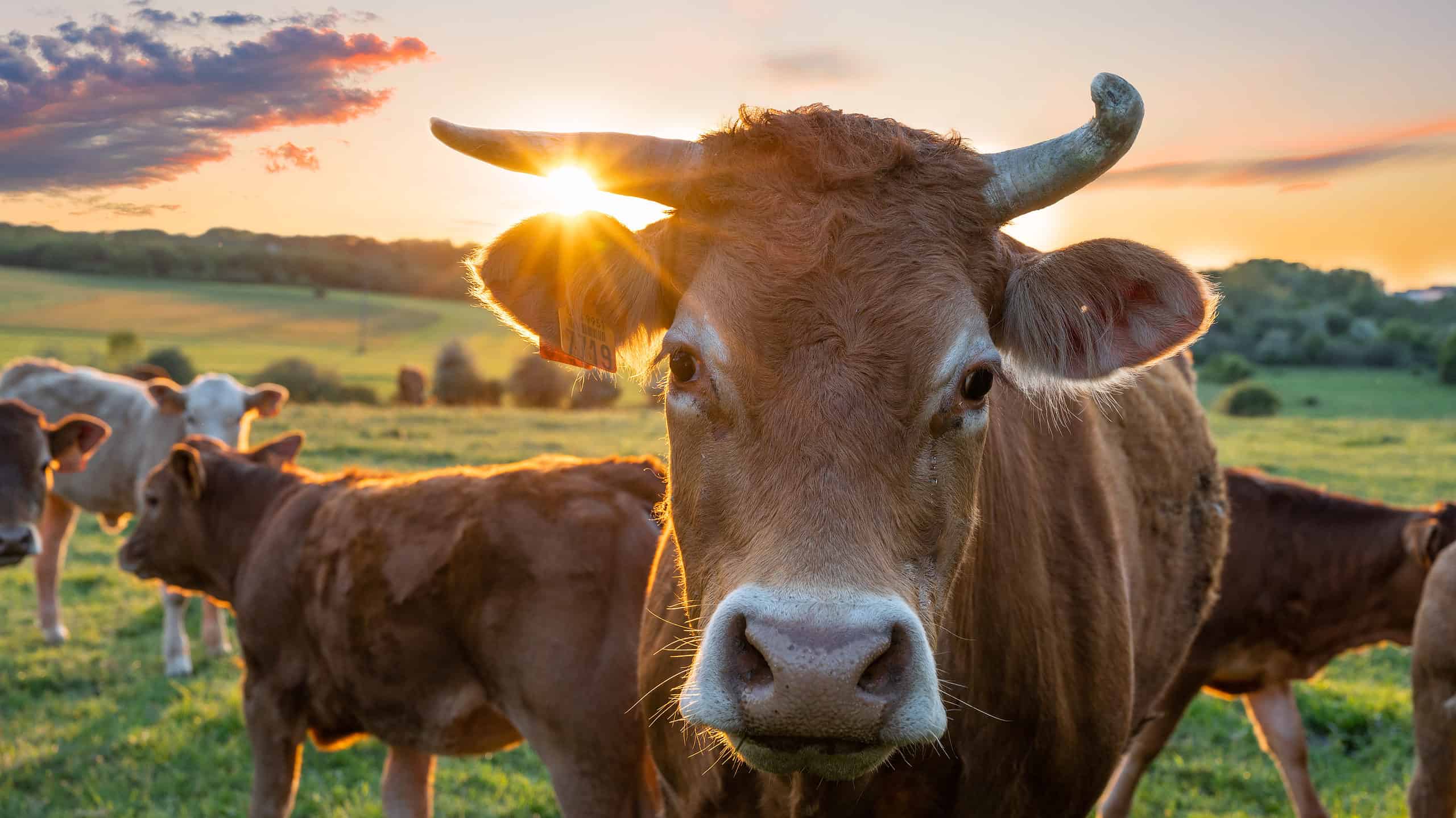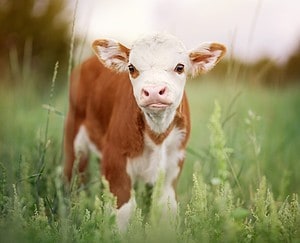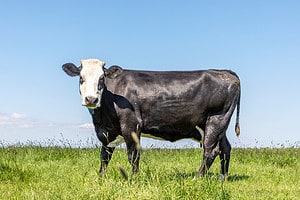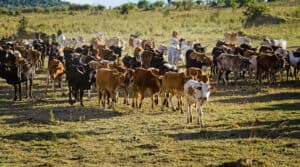Cows, traditionally seen only as providers of milk and meat, offer far more than meets the eye. We often underestimate these gentle giants when it comes to intelligence. Yet they possess an array of cognitive and emotional capacities. This is so to an extent that should fundamentally challenge our understanding of animal intelligence. Their sophisticated cognitive abilities encompass problem-solving complexities, facial and location recognition, and more. Their rich emotional intelligence allows them to express a diverse range of feelings.
As we embark on this exploration of the world of bovine intelligence, we’ll uncover their intricate cognitive and emotional capabilities. We’ll also plumb the implications of their intelligence for farming practices. Additionally, we’ll pay tribute to the influential work of prominent animal behaviorists and researchers. Finally, we’ll glimpse the promising future of bovine intelligence research. It’s a realm that holds the potential not only to revolutionize our understanding of these docile creatures but also to foster advancements in animal welfare and agricultural productivity.
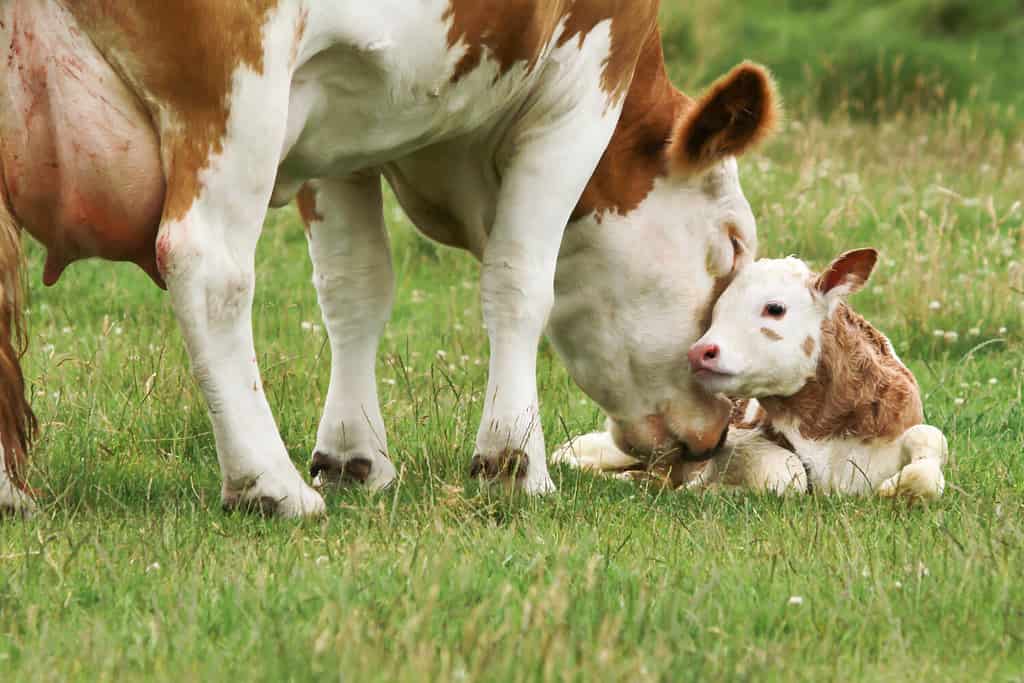
Cows are highly social animals, with herds often co-raising calves.
©Canetti/Shutterstock.com
Understanding the Cow Brain
Cows exhibit impressive cognitive and emotional intelligence. They possess substantial problem-solving skills, enabling them to interact effectively with their environment. This intelligence isn’t confined to the tangible realm; it also extends profoundly into the emotional sphere. Cows form intricate social relationships within their herd. The can recognize over 100 fellow cows, keeping memories of these relationships for several years. Further, cows express a range of feelings, from fear and anxiety to happiness.
Comparing Bovine Intelligence to Other Species in the Animal Kingdom
Many species in the animal kingdom exhibit signs of intelligence and self-awareness. For instance, many chimpanzees and orangutans can learn to recognize their reflections in mirrors. This suggests they have a cognitive category for processing mirrored information about themselves. This self-recognition shows a sense of continuity, personal agency, and mental-state attribution.
However, it’s important to note that self-recognition in mirrors is not the only measure of animal intelligence. Many animals, including cows, may not pass the mirror test but still display significant cognitive abilities. For instance, crows can solve complex puzzles, octopuses can escape from closed jars, and elephants can remember routes to water sources over many miles and years.
In comparison, cows might not exhibit self-recognition, but their problem-solving skills, memory, and emotional intelligence make them comparably intelligent within the animal kingdom. We need more research to fully understand and compare the breadth of bovine intelligence to that of other species.
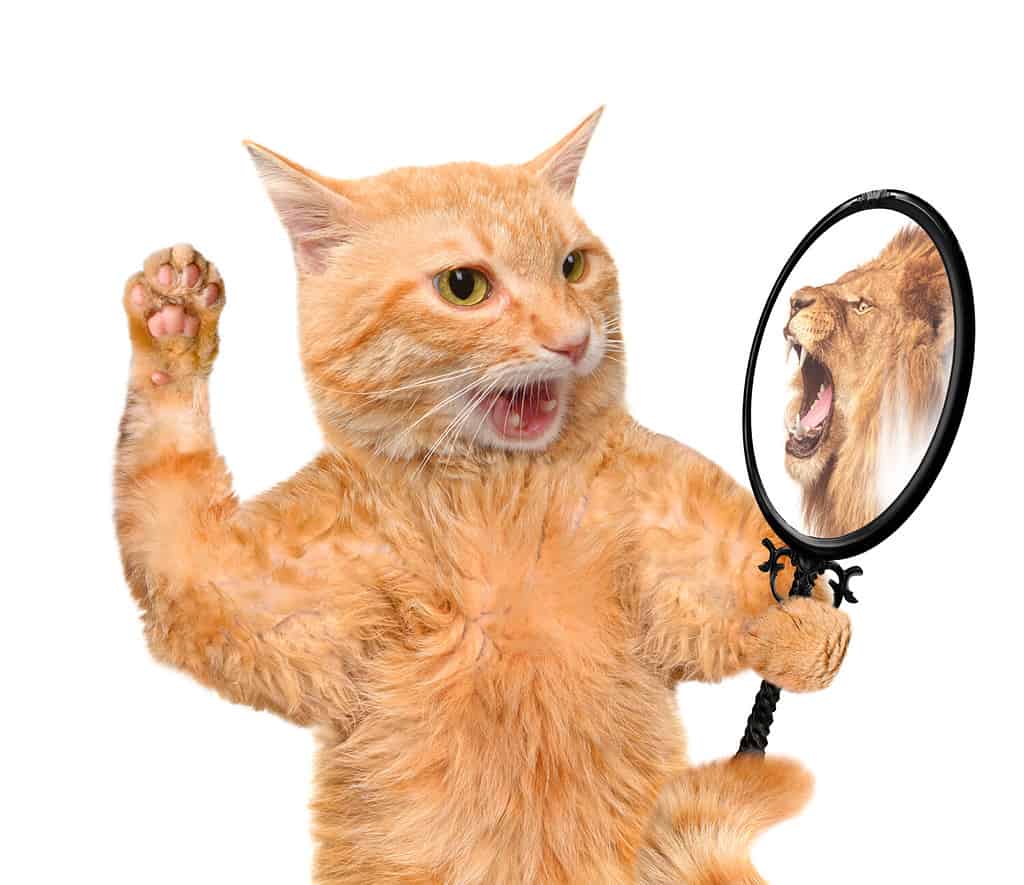
Cats, like cows, have not convincingly passed the self-recognition test, also known as the mirror test.
©Rasulov/Shutterstock.com
Snapshot Comparisons
Cows vs Dogs
Cows are often compared to dogs in terms of intelligence. They have been found to have excellent critical thinking skills and a strong understanding of cause-and-effect relationships. Cows are famous for their ability to learn how to use a lever to activate a drinking fountain and a button to unlock food when they’re hungry or thirsty. Researchers have found that cows not only can figure out problems but also enjoy the intellectual challenge and get excited when they find a solution, just as dogs do.
Cows vs Other Animals
Cows are generally quite intelligent animals who can remember things for a long time. Animal behaviorists have found that they interact in socially complex ways. They develop friendships by spending time together, as humans do. And like us, they are known to hold grudges against fellow cows that treat them badly.
Cows vs Humans
While it’s not entirely fair to compare the intelligence of cows to humans due to our different evolutionary paths and needs, cows do exhibit advanced cognitive abilities. They understand cause-and-effect relationships, can solve problems (as mentioned above), and even celebrate their successes.
Past Discoveries and Studies on Bovine Intelligence
The Psychology of Cows
In unraveling bovine intelligence, a notable research paper is “The Psychology of Cows” by Lori Marino and Kristin Allen. The paper dives deep into the psychological complexity of cows and highlights their profound capacity for emotion, social complexity, and problem-solving. In addition to their understanding of cause-and-effect relationships, a crucial aspect of problem-solving, they form complex relationships within their herds. Moreover, they experience a spectrum of emotions from fear and anxiety to happiness. This knowledge expands our understanding of cows’ cognitive capabilities and reinforces the existence of emotional intelligence in these animals.
In addition to their profound cognitive abilities, cows demonstrate complex social structures. They create maternal collectives and care for each other’s calves. Further, their distinct personalities impact the social dynamics within the herd. Unfortunately, these emotional capabilities also render them susceptible to distress due to certain farming practices. Early separation of dairy calves from their mothers, for example, can result in emotional distress and negative cognitive bias, which can affect their well-being.
Marino and Allen further highlight the need for continuous research to challenge our preconceived notions about animal cognition. There exists a knowledge translation gap, with evidence of animal sentience and well-being often overlooked. This leads to the mistreatment of cows and other food animals. The authors advocate for bridging this gap by challenging the status quo, given our awareness of their cognitive and emotional capacities.
Cows Are Sensitive
Cows also get the doldrums. Studies such as the one by Daniel Weary and his colleagues at the University of British Columbia reveal that animals, including cows, can display negative judgment biases when in negative emotional states. They found that dairy calves exhibit a pessimistic outlook and decreased cognitive abilities when subjected to stressful procedures. These include early separation from their mothers and dehorning.
Shifting the focus to human-animal relationships (HAR) in dairy farms, a UK study suggested there abounds a generally good quality of HAR. They found that only 21% of farmers believe that dairy cattle fear humans. Interestingly, the study showed a possible correlation between a farmer’s attention to animals (like knowing each animal’s name) and improved milk yield and animal behavior. This suggests that an improved HAR could potentially enhance dairy farming productivity.
Near-Consensus
Another survey conducted on the perception of animal intelligence revealed a majority consensus that domestic animals have minds, can think, and hence should be treated humanely. This consensus, however, is not universal. There remains some disagreement among professionals in animal sciences and zoology, especially when it comes to agreeing on definitions such as concept of mind.
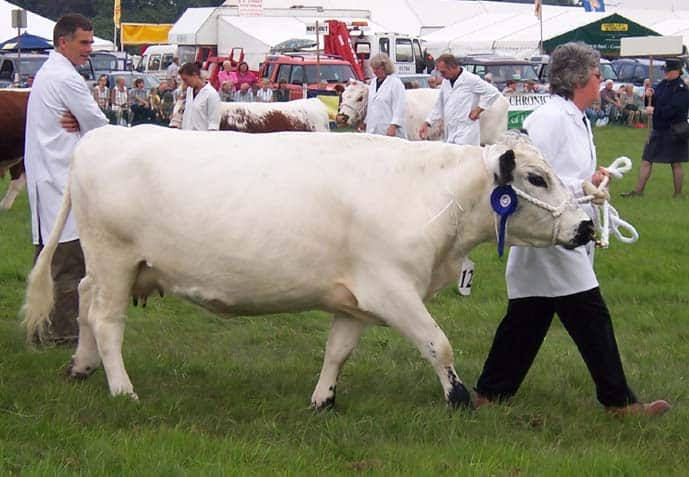
Highly sensitive, cows respond negatively to stress and positively to human attention. So it’s unsurprising that blue ribbon winners are well-treated by their humans.
©Malcolm Morley – Public Domain
Temple Grandin’s Contributions to Understanding Bovine Behavior and Intelligence
Dr. Temple Grandin, a renowned animal behaviorist and autism advocate, has significantly influenced livestock handling and welfare practices. She’s greatly enhanced our understanding of bovine behavior and intelligence.
One of her notable contributions is designing humane handling systems for cows in slaughterhouses to minimize the stress and fear animals experience. Grandin’s work has played a significant role in shifting perceptions about animal intelligence and emotions. She’s been a staunch advocate for recognizing and respecting the emotional lives of animals.
Implications of Bovine Intelligence for Farming Practices and Animal Welfare
Understanding bovine intelligence and their emotional and social needs profoundly influences farming practices and animal welfare. For instance, maintaining stable social groups can improve the welfare of cows, promoting overall well-being. In addition, understanding the emotional bond between cows and their calves can inform more humane dairy farming practices.
Artificial Intelligence for Farm Animals
The advent of Artificial Intelligence (AI) has brought significant advancements in numerous fields, including animal welfare. Suresh Neethirajan, a scientist from Wageningen University & Research has pioneered an AI-based application named WUR Wolf. The playfully named WUR Wolf uses Python-based algorithms to detect and track the facial features of cows and pigs. These include their appearance, ear postures, and the regions of their eyes that are white. With these inputs, it can infer the emotional states of the animals with an impressive average accuracy of 85%. Trained on datasets collected from multiple farms, the platform can identify 13 facial actions and 9 emotional states. These include aggression, calmness, and neutrality.
The system’s real-time capability to recognize facial expressions could revolutionize our understanding and management of farm animal behaviors. It offers the promise of an automated decision-making tool for livestock farmers. Further, it could play a significant role in enhancing animal welfare and improving animal-human interactions within the livestock farming industry. By promoting positive emotional states, such as playfulness and peacefulness, in farm animals, the platform could lead to increased productivity and higher quality-of-life for the animals.
A Little Respect
However, current practices in the animal industry often hinder cows from engaging in natural behaviors. This adversely affects their well-being and social development. Acknowledging and respecting the sentience of cows is pivotal to treating them with kindness and ensuring they receive the protection they deserve. This respect calls for a shift in farming practices. Doing so would start to bridge the gap between our understanding of cows and the practices of the animal industry.
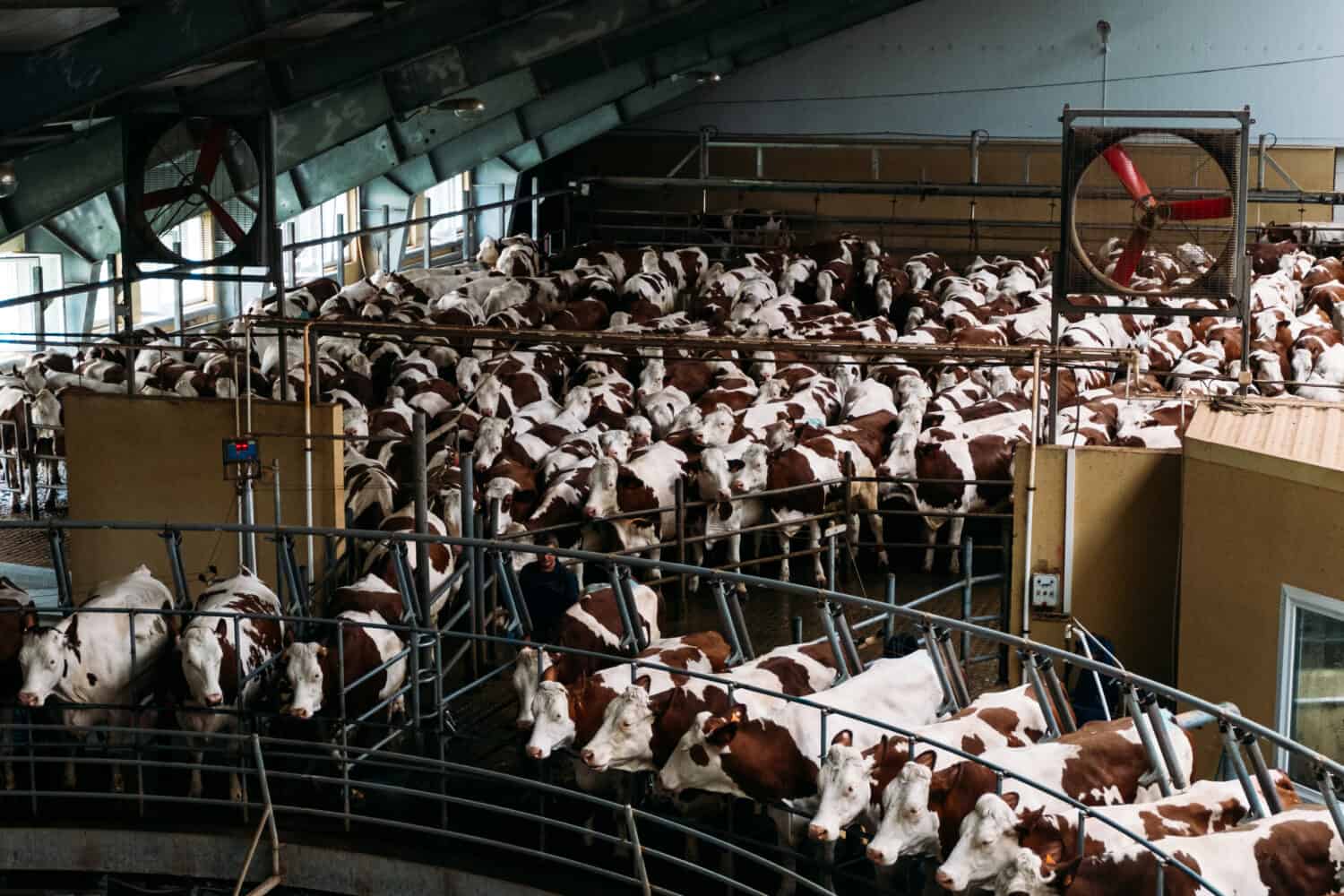
Factory farms hurt not only animals, but also the people who live nearby. They emit several channels of pollution, most significantly water and air pollutants.
©Dobrovizcki/Shutterstock.com
Future Directions and Potential Advancements in Bovine Intelligence Research
The field of bovine intelligence research offers the potential to uncover more about the cognitive capabilities of these creatures. Future research endeavors are likely to employ innovative methods. These would aim to gather comprehensive data and analyze the cognitive capabilities of cattle in unprecedented depth. Additionally, there are numerous unanswered questions within the field of bovine intelligence that future research could aim to resolve. They include things like the impact of social structures on bovine learning aptitude, as well as getting a better picture of their emotional lives. This research will not only improve our understanding of cows but also reshape our interactions and relationships with these intelligent beings.
Conclusion
Given that we raise, slaughter, and eat cows, bovine intelligence presents a unique dilemma. The depth of their cognitive and emotional abilities, which extend to complex problem-solving, social relationships, and emotional expression, is a testament to their place in the animal kingdom’s intelligentsia. The work of animal behaviorists and psychologists, such as Dr. Temple Grandin, has significantly enriched our understanding of bovine behavior and intelligence. Such work spurs on advocacy for more humane and informed practices.
While scientific research continues to expand our perspective on animal cognition, many of our practices toward cows remain unchanged. As we venture into the future of bovine intelligence research, we are better positioned to learn more about these fascinating creatures. Doing so would improve our agricultural practices and broaden our comprehension of animal cognition. Recognizing cows as sentient beings is a vital step toward a more compassionate and sustainable world.
Thank you for reading! Have some feedback for us? Contact the AZ Animals editorial team.

